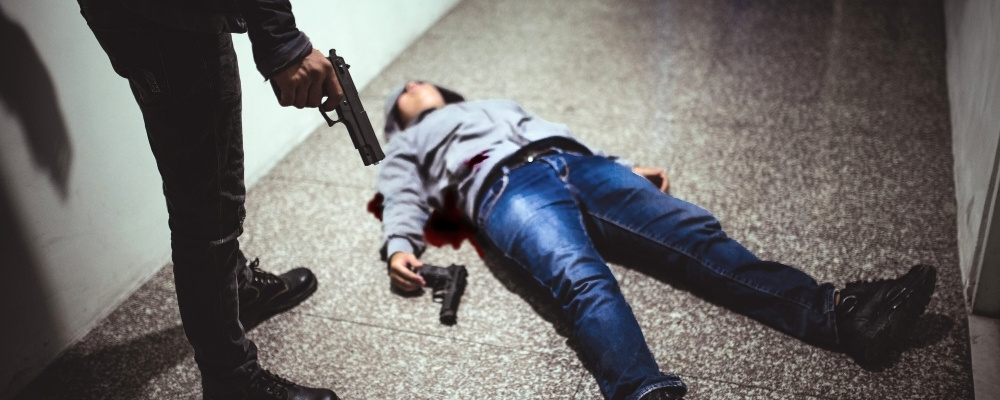Homicide in Colorado
The attorneys at Rights & Liberties Law Firm are experienced homicide attorneys in Colorado who defend people charged with all types of homicide offenses including first degree murder, second degree murder, manslaughter, criminally negligent homicide, vehicular homicide, and child abuse resulting in death. Here is an overview of the elements, possible penalties, and common defenses for each type of homicide offense under the Colorado Revised Statutes.
First Degree Murder
Under Colorado’s Murder in the First Degree Statute C.R.S. 18-3-102:
A person commits the crime of murder in the first degree if:
(a) After deliberation and with the intent to cause the death of a person other than himself, he causes the death of that person or of another person; or
(b) Repealed.
(c) By perjury or subornation of perjury he procures the conviction and execution of any innocent person; or
(d) Under circumstances evidencing an attitude of universal malice manifesting extreme indifference to the value of human life generally, he knowingly engages in conduct which creates a grave risk of death to a person, or persons, other than himself, and thereby causes the death of another; or
(e) He or she commits unlawful distribution, dispensation, or sale of a controlled substance to a person under the age of eighteen years on school grounds as provided in section 18-18-407 (2), or 18-18-407 (1)(g)(I) for offenses committed on or after October 1, 2013, and the death of such person is caused by the use of such controlled substance; or
(f) The person knowingly causes the death of a child who has not yet attained twelve years of age and the person committing the offense is one in a position of trust with respect to the victim.
(2) Repealed.
(3) Murder in the first degree is a class 1 felony.
(4) The statutory privilege between patient and physician and between husband and wife shall not be available for excluding or refusing testimony in any prosecution for the crime of murder in the first degree as described in paragraph (f) of subsection (1) of this section.
What Are the Possible Penalties for First Degree Murder in Colorado?
Life without parole. LWOP.
What Are the Defenses to First Degree Murder in Colorado?
General Denial
The defense may argue that the prosecution has failed to prove beyond a reasonable doubt that the defendant committed the crime. This involves challenging the credibility of the evidence and witnesses presented by the prosecution.
Lack of Intent and Deliberation
First-degree murder requires proof of intent and premeditation. The defense can argue that the defendant did not have the intent to kill or that the killing was not premeditated. This can potentially reduce the charge to a lesser offense, such as second-degree murder or manslaughter.
Self-Defense
The defendant may claim that they acted in self-defense, believing that their life was in imminent danger. To succeed, the defense must show that the use of force was necessary and proportionate to the threat faced.
Defense of Others
Similar to self-defense, this defense argues that the defendant acted to protect another person from imminent harm. The force used must be reasonable and necessary under the circumstances.The accused can raise the heat of passion defense in limited circumstances to reduce a class 3 felony first degree assault to a class 5 felony offense.
Mistaken Identity
The defense may argue that the defendant was wrongly identified as the perpetrator. This can involve presenting evidence such as alibi witnesses, surveillance footage, or forensic evidence that points to someone else.
Alternate Suspect
The defense can argue that another person committed the crime. This involves presenting evidence that implicates an alternate suspect, thereby creating reasonable doubt about the defendant’s guilt.
Alibi
An alibi defense involves proving that the defendant was somewhere else at the time the crime was committed. This can be supported by witness testimony, receipts, video footage, or other evidence showing the defendant’s whereabouts.
Insanity
The insanity defense argues that the defendant was legally insane at the time of the crime and therefore lacked the capacity to understand the nature of their actions or distinguish right from wrong. This defense requires substantial medical and psychological evidence.
Accident
The defense can claim that the killing was accidental and not the result of intentional or reckless behavior. This can involve demonstrating that the death occurred due to unforeseen circumstances or a lack of criminal intent. This defense can potentially reduce the charge to a lesser offense, such as second-degree murder, manslaughter, or criminally negligent homicide.
Intoxication
Voluntary intoxication is generally not a defense to first-degree murder, but it can be used to argue that the defendant was incapable of forming the specific intent required for the charge. Involuntary intoxication, on the other hand, can be a complete defense if it can be shown that the defendant was unknowingly drugged or forced to consume intoxicants.

Second Degree Murder
(1) A person commits the crime of murder in the second degree if:
(a) The person knowingly causes the death of a person; or
(b) Acting either alone or with one or more persons, he or she commits or attempts to commit felony arson, robbery, burglary, kidnapping, sexual assault as prohibited by section 18-3-402, sexual assault in the first or second degree as prohibited by section 18-3-402 or 18-3-403, as those sections existed prior to July 1, 2000, or a class 3 felony for sexual assault on a child as provided in section 18-3-405 (2), or the felony crime of escape as provided in section 18-8-208, and, in the course of or in furtherance of the crime that he or she is committing or attempting to commit, or of immediate flight therefrom, the death of a person, other than one of the participants, is caused by any participant.
(1.5) It is an affirmative defense to a charge of violating subsection (1)(b) of this section that the defendant:
(a) Was not the only participant in the underlying crime; and
(b) Did not commit the homicidal act or in any way solicit, request, command, importune, cause, or aid the commission thereof; and
(c) Was not armed with a deadly weapon; and
(d) Did not engage himself or herself in or intend to engage in and had no reasonable ground to believe that any other participant intended to engage in conduct likely to result in death or serious bodily injury.
(2) Diminished responsibility due to self-induced intoxication is not a defense to murder in the second degree.(2.5)(Deleted by amendment, L. 96, p. 1844, § 12, effective July 1, 1996.)(3)(a) Except as otherwise provided in paragraph (b) of this subsection (3), murder in the second degree is a class 2 felony.
(b) Notwithstanding the provisions of paragraph (a) of this subsection (3), murder in the second degree is a class 3 felony where the act causing the death was performed upon a sudden heat of passion, caused by a serious and highly provoking act of the intended victim, affecting the defendant sufficiently to excite an irresistible passion in a reasonable person; but, if between the provocation and the killing there is an interval sufficient for the voice of reason and humanity to be heard, the killing is a class 2 felony.
(c) For purposes of determining sudden heat of passion pursuant to subsection (3)(b) of this section, a defendant’s act does not constitute an act performed upon a sudden heat of passion if it results solely from the discovery of, knowledge about, or potential disclosure of the victim’s actual or perceived gender, gender identity, gender expression, or sexual orientation, including but not limited to under circumstances in which the victim made an unwanted nonforcible romantic or sexual advance toward the defendant.
What Are the Possible Penalties for Second Degree Murder in Colorado?
Second degree murder carries a mandatory prison sentence of 16-48 years in the Department of Corrections. If a person knowingly caused the death of another under sudden heat of passion, the offense carries a mandatory 10-32 years in the Department of Corrections. See the penalties table below.
What Are the Defenses to Second Degree Murder in Colorado?
General Denial
The defense may argue that the prosecution has failed to prove beyond a reasonable doubt that the defendant committed the crime. This involves challenging the credibility of the evidence and witnesses presented by the prosecution.
Lack of Mens Rea
Second-degree murder requires proof that the defendant acted knowingly, meaning the defendant was aware of his conduct and practically certain his conduct would case the death of another. The defense can argue that the defendant did not possess the necessary mens rea (mental state) to commit second-degree murder.
Self-Defense
The defendant may claim that they acted in self-defense, believing that their life was in imminent danger. To succeed, the defense must show that the use of force was necessary and proportionate to the threat faced.
Defense of Others
Similar to self-defense, this defense argues that the defendant acted to protect another person from imminent harm. The force used must be reasonable and necessary under the circumstances.
Heat of Passion
What is heat of passion in Colorado? The defense can argue that the defendant acted in the heat of passion. Heat of passion means that the act causing the death of another was performed upon a sudden heat of passion, caused by a serious and highly provoking act of the intended victim, affecting the defendant sufficiently to excite an irresistible passion in a reasonable person. If a jury finds heat of passion, the offense is reduce from a F2 carrying 16-48 years in prison to an F3 carrying 10-32 years in prison.
Mistaken Identity
The defense may argue that the defendant was wrongly identified as the perpetrator. This can involve presenting evidence such as alibi witnesses, surveillance footage, or forensic evidence that points to someone else.
Alternate Suspect
The defense can suggest that another person committed the crime. This involves presenting evidence that implicates an alternate suspect, thereby creating reasonable doubt about the defendant’s guilt.
Alibi
An alibi defense involves proving that the defendant was somewhere else at the time the crime was committed. This can be supported by witness testimony, receipts, video footage, or other evidence showing the defendant’s whereabouts.
Insanity
The insanity defense argues that the defendant was legally insane at the time of the crime and therefore lacked the capacity to understand the nature of their actions or distinguish right from wrong. This defense requires substantial medical and psychological evidence.
Coercion or Duress
The defense may argue that the defendant was forced to commit the crime under threat of imminent harm to themselves or others. This defense requires evidence that the threat was immediate and that the defendant had no reasonable opportunity to escape.
Accident
The defense can claim that the killing was accidental and not the result of intentional or reckless behavior. This can involve demonstrating that the death occurred due to unforeseen circumstances or a lack of criminal intent.
Intoxication
Voluntary intoxication is generally not a defense to second-degree murder, but it can be used to argue that the defendant was incapable of forming the specific intent required for the charge. Involuntary intoxication, on the other hand, can be a complete defense if it can be shown that the defendant was unknowingly drugged or forced to consume intoxicants.

What is Felony Murder in Colorado?
Felony murder is a legal doctrine that allows a defendant to be charged with murder if a death occurs during the commission of a felony arson, robbery, burglary, kidnapping, sexual assault, sexual assault on a child or escape even if the defendant did not intend to kill. Under this rule, if someone dies while the defendant is committing or attempting to commit one of the above felonies the defendant can be held liable for murder even if he or she didn’t kill anyone. This doctrine applies regardless of whether the death was accidental or caused by another participant in the felony.
What Are the Defenses to Felony Murder in Colorado?
Colorado’s felony murder statute provides the following affirmative defense:
It is an affirmative defense to a charge of felony murder that the defendant:
Was not the only participant in the underlying crime; and
Did not commit the homicidal act or in any way solicit, request, command, importune, cause, or aid the commission thereof; and
Was not armed with a deadly weapon; and
Did not engage himself or herself in or intend to engage in and had no reasonable ground to believe that any other participant intended to engage in conduct likely to result in death or serious bodily injury.
What Are the Possible Penalties for Felony Murder in Colorado?
Felony murder carries a mandatory prison sentence of 16-48 years in the Department of Corrections.

Manslaughter
Under Colorado’s manslaughter statute, C.R.S. 18-3-104:
(1) A person commits the crime of manslaughter if:
(a) Such person recklessly causes the death of another person; or
(b) Such person intentionally causes or aids another person to commit suicide.
(c) (Deleted by amendment, L. 96, p. 1844, § 13, effective July 1, 1996.)
(2) Manslaughter is a class 4 felony.
(3) This section shall not apply to a person, including a proxy decision-maker as such person is described in section 15-18.5-103, C.R.S., who complies with any advance medical directive in accordance with the provisions of title 15, C.R.S., including a medical durable power of attorney, a living will, or a cardiopulmonary resuscitation (CPR) directive.
(4)
(a) This section shall not apply to a medical caregiver with prescriptive authority or authority to administer medication who prescribes or administers medication for palliative care to a terminally ill patient with the consent of the terminally ill patient or his or her agent.
(b) For purposes of this subsection (4):
(I) ”Agent“ means a person appointed to represent the interests of the terminally ill patient by a medical power of attorney, power of attorney, health-care proxy, or any other similar statutory or regular procedure used for designation of such person.
(II) ”Medical caregiver“ means a physician, registered nurse, nurse practitioner, physician assistant, or anesthesiologist assistant licensed by this state.
(III) ”Palliative care“ means medical care and treatment provided by a licensed medical caregiver to a patient with an advanced chronic or terminal illness whose condition may not be responsive to curative treatment and who is, therefore, receiving treatment that relieves pain and suffering and supports the best possible quality of his or her life.
(c) Paragraph (a) of this subsection (4) shall not be interpreted to permit a medical caregiver to assist in the suicide of the patient.
What Are the Defenses to Manslaughter in Colorado?
General Denial
Lack of Mens Rea
Manslaughter requires proof that the defendant acted recklessly. In Colorado, a person acts recklessly when they consciously disregard a substantial and unjustifiable risk that a result will occur or that a circumstance exists. This means that the person is aware of the risk but chooses to ignore it, which represents a gross deviation from the standard of care that a reasonable person would exercise in the same situation, meaning the defendant was aware of his conduct and practically certain his conduct would case the death of another. The defense can argue that the defendant did not possess the necessary mens rea (mental state) of recklessness to commit manslaughter.
Self-Defense
The defendant may claim that they acted in self-defense, believing that their life was in imminent danger. To succeed, the defense must show that the use of force was necessary and proportionate to the threat faced.
Defense of Others
Similar to self-defense, this defense argues that the defendant acted to protect another person from imminent harm. The force used must be reasonable and necessary under the circumstances.
Mistaken Identity
The defense may argue that the defendant was wrongly identified as the perpetrator. This can involve presenting evidence such as alibi witnesses, surveillance footage, or forensic evidence that points to someone else.
Alternate Suspect
The defense can suggest that another person committed the crime. This involves presenting evidence that implicates an alternate suspect, thereby creating reasonable doubt about the defendant’s guilt.
Alibi
An alibi defense involves proving that the defendant was somewhere else at the time the crime was committed. This can be supported by witness testimony, receipts, video footage, or other evidence showing the defendant’s whereabouts.
Insanity
The insanity defense argues that the defendant was legally insane at the time of the crime and therefore lacked the capacity to understand the nature of their actions or distinguish right from wrong. This defense requires substantial medical and psychological evidence.
Coercion or Duress
The defense may argue that the defendant was forced to commit the crime under threat of imminent harm to themselves or others. This defense requires evidence that the threat was immediate and that the defendant had no reasonable opportunity to escape.
Accident
The defense can claim that the killing was accidental and not the result of intentional or reckless behavior. This can involve demonstrating that the death occurred due to unforeseen circumstances or a lack of criminal intent.
What Are the Possible Penalties for Manslaughter in Colorado?
Manslaughter is a class 4 felony that carries 2-6 years in the Department of Corrections. For more details see the homicide penalties grid below.

Criminally Negligent Homicide in Colorado
Under Colorado’s criminally negligent homicide statute, C.R.S. 18-3-105:
Any person who causes the death of another person by conduct amounting to criminal negligence commits criminally negligent homicide which is a class 5 felony.
To be guilty of criminally negligent homicide the defendant must fail to perceive a substantial and unjustifiable risk that a certain result will occur, and the risk must be of such a nature that the defendant’s failure to perceive it constitutes a gross deviation from a reasonable person’s standard of care.
What are the Defenses to Criminally Negligent Homicide?
General Denial
The defense may argue that the prosecution has failed to prove beyond a reasonable doubt that the defendant committed the crime. This involves challenging the credibility of the evidence and witnesses presented by the prosecution.
Lack of Mens Rea
Criminally negligent homicide requires proof that the defendant acted negligently, meaning the defendant failed to perceive a substantial and unjustifiable risk that a certain result will occur, and the risk must be of such a nature that the defendant’s failure to perceive it constitutes a gross deviation from a reasonable person’s standard of care. The defense can argue that the defendant did not possess the necessary mens rea (mental state) to commit criminally negligent homicide.
Self-Defense
The defendant may claim that they acted in self-defense, believing that their life was in imminent danger. To succeed, the defense must show that the use of force was necessary and proportionate to the threat faced.
Defense of Others
Similar to self-defense, this defense argues that the defendant acted to protect another person from imminent harm. The force used must be reasonable and necessary under the circumstances.
Mistaken Identity
The defense may argue that the defendant was wrongly identified as the perpetrator. This can involve presenting evidence such as alibi witnesses, surveillance footage, or forensic evidence that points to someone else.
Alternate Suspect
The defense can suggest that another person committed the crime. This involves presenting evidence that implicates an alternate suspect, thereby creating reasonable doubt about the defendant’s guilt.
Alibi
An alibi defense involves proving that the defendant was somewhere else at the time the crime was committed. This can be supported by witness testimony, receipts, video footage, or other evidence showing the defendant’s whereabouts.
Insanity
The insanity defense argues that the defendant was legally insane at the time of the crime and therefore lacked the capacity to understand the nature of their actions or distinguish right from wrong. This defense requires substantial medical and psychological evidence.
Coercion or Duress
The defense may argue that the defendant was forced to commit the crime under threat of imminent harm to themselves or others. This defense requires evidence that the threat was immediate and that the defendant had no reasonable opportunity to escape.
Accident
The defense can claim that the killing was accidental and not the result of criminal negligence. This can involve demonstrating that the death occurred due to unforeseen circumstances or a lack of criminal negligence.
What Are the Possible Penalties for Criminally Negligent Homicide in Colorado?
Criminally negligent homicide is a class 5 felony that carries 2-3 years in the Department of Corrections. For more details see the homicide penalties grid below.

Vehicular Homicide in Colorado
In Colorado, under C.R.S. 18-3-106, a person commits vehicular homicide if they cause the death of another person through the operation of a motor vehicle in a reckless manner or while under the influence of alcohol or drugs.
What Are the Key Elements of Vehicular Homicide?
Reckless Driving: If a person operates a motor vehicle in a reckless manner, and this conduct is the proximate cause of another person’s death, they can be charged with vehicular homicide. Reckless driving involves a conscious disregard of a substantial and unjustifiable risk.
Driving Under the Influence (DUI): If a person operates a motor vehicle while under the influence of alcohol or drugs, and this conduct is the proximate cause of another person’s death, they can be charged with vehicular homicide. This includes driving while impaired by alcohol or drugs.
What Are the Penalties for Vehicular Homicide in Colorado?
Reckless Driving: Vehicular homicide by reckless driving is classified as a Class 4 felony, which can result in 2 to 6 years in prison and/or fines ranging from $2,000 to $500,000.
DUI: Vehicular homicide while driving under the influence is classified as a Class 3 felony, which can result in 4 to 12 years in prison and/or fines ranging from $3,000 to $750,000.
Important Vehicular Homicide Definitions
Reckless Driving: Consciously disregarding a substantial and unjustifiable risk that a result will occur or that a circumstance exists.
Proximate Cause: The death must be a natural and probable consequence of the defendant’s conduct.
Under the Influence: Driving when alcohol or drugs impair the person’s ability to exercise clear judgment, sufficient physical control, or due care in the safe operation of a vehicle.

Homicide Penalties in Colorado
Homicide
18-3-102(1)(a) First Degree Murder (intent deliberation)
After deliberation
Intent to cause death of another
Cause death of another
18-3-102(1)(d) First Degree Murder (extreme indifference)
Extreme indifference to value of life
Knowingly create grave risk death to another
Thereby causing death of another
18-3-102(1)(e) First Degree Murder (distribution)
Distribute controlled substance
To person under 18
On school grounds
Death of person caused by use of the controlled substance
18-3-102(1)(f) First Degree Murder (death of child)
Knowingly cause death of child under 12 years old
Defendant in position of trust
18-3-103(1)(a) Second Degree Murder
Knowingly cause death of another person
18-3-103(1)(b) Second Degree Murder (Felony Murder)
Commit/Attempt: arson, robbery, burglary, kidnap, sex assault, sex assault on child, or escape
In course/furtherance/flight of above crime
Death of a non-participant caused by anyone
18-3-103(2)(b) Second Degree Murder (heat of passion)
Knowingly cause death of another
Act causing death committed in heat of passion
18-3-104 Manslaughter
Recklessly causing the death of another person, or intentionally causing or aiding another person to commit suicide.
18-3-105 Criminally negligent homicide
Any person who causes the death of another person by conduct amounting to criminal negligence commits criminally negligent homicide.
18-3-106 Vehicular Homicide – Reckless Driving
18-3-106 Vehicular Homicide – DUI
Possible Penalties
F1 Life without parole.
F1 Life without parole.
F1 Life without parole.
F1 Life without parole.
F2 COV
Mandatory 16-48 years in DOC
F2 COV
Mandatory 16-48 years in DOC
F3 COV
Mandatory 10-32 years in DOC
Class 4 Felony
- 2-6 years in Colorado State Prison or Community Corrections followed by 3 years of mandatory parole; or
- Probation; and/or
- $2,000 – $500,000 fine;
- Restitution
Class 5 Felony
- 1-3 years in Colorado State Prison or Community Corrections followed by 2 years of mandatory parole; or
- Probation; and/or
- $1,000 – $100,000 fine;
- Restitution
Class 4 Felony
- 2-6 years in Colorado State Prison or Community Corrections followed by 3 years of mandatory parole; or
- Probation; and/or
- $2,000 – $500,000 fine;
- Restitution
Class 3 Felony
- 4-12 years in Colorado State Prison followed by 3 years of mandatory parole; or
- Probation; and/or
- $3,000 – $750,000 fine;
- Restitution
Homicide
18-3-102(1)(a) First Degree Murder (intent deliberation)
After deliberation
Intent to cause death of another
Cause death of another
18-3-102(1)(d) First Degree Murder (extreme indifference)
Extreme indifference to value of life
Knowingly create grave risk death to another
Thereby causing death of another
18-3-102(1)(e) First Degree Murder (distribution)
Distribute controlled substance
To person under 18
On school grounds
Death of person caused by use of the controlled substance
18-3-102(1)(f) First Degree Murder (death of child)
Knowingly cause death of child under 12 years old
Defendant in position of trust
18-3-103(1)(a) Second Degree Murder
Knowingly cause death of another person
18-3-103(1)(b) Second Degree Murder (Felony Murder)
Commit/Attempt: arson, robbery, burglary, kidnap, sex assault, sex assault on child, or escape
In course/furtherance/flight of above crime
Death of a non-participant caused by anyone
18-3-103(2)(b) Second Degree Murder (heat of passion)
Knowingly cause death of another
Act causing death committed in heat of passion
18-3-104 Manslaughter
Recklessly causing the death of another person, or intentionally causing or aiding another person to commit suicide.
18-3-105 Criminally negligent homicide
Any person who causes the death of another person by conduct amounting to criminal negligence commits criminally negligent homicide.
18-3-106 Vehicular Homicide – Reckless Driving
18-3-106 Vehicular Homicide – DUI
F1 Life without parole.
F1 Life without parole.
F1 Life without parole.
F1 Life without parole.
F2 COV
Mandatory 16-48 years in DOC
F2 COV
Mandatory 16-48 years in DOC
F3 COV
Mandatory 10-32 years in DOC
Class 4 Felony
- 2-6 years in Colorado State Prison or Community Corrections followed by 3 years of mandatory parole; or
- Probation; and/or
- $2,000 – $500,000 fine;
- Restitution
Class 5 Felony
- 1-3 years in Colorado State Prison or Community Corrections followed by 2 years of mandatory parole; or
- Probation; and/or
- $1,000 – $100,000 fine;
- Restitution
Class 4 Felony
- 2-6 years in Colorado State Prison or Community Corrections followed by 3 years of mandatory parole; or
- Probation; and/or
- $2,000 – $500,000 fine;
- Restitution
Class 3 Felony
- 4-12 years in Colorado State Prison followed by 3 years of mandatory parole; or
- Probation; and/or
- $3,000 – $750,000 fine;
- Restitution
Statute of Limitations for Homicide Related Offenses in Colorado
In Colorado the statute of limitations for commencing criminal charges against a person is governed by C.R.S. Section 16-5-401. The statute of limitations for commencing criminal charges for homicide offenses in Colorado is as follows:
- Felony First or Second Degree Murder – no limit to the statute of limitations. First or Second Degree Murder charges have no statute of limitations.
- Felony vehicular homicide charges must be filed within 5 years.
- All other felony homicide related offenses including manslaughter and criminally negligent homicide must be filed within 3 years.
Legal References
- C.R.S. 18-3-102 – Murder in the first degree (2023)
- C.R.S. 18-3-103 – Murder in the second degree (2023)
- C.R.S. 18-3-104 – Manslaughter (2023)
- C.R.S. 18-3-105 – Criminally negligent homicide (2023)
- C.R.S. 18-3-106 – Vehicular homicide (2023)
- C.R.S. 18-3-107 – First degree murder of a peace officer, firefighter, or emergency medical service provider (2023)
Contact Colorado’s Homicide Attorneys at Rights & Liberties Law Firm to Fight for You Today
If you’ve been charged with a homicide related offense contact the attorneys at Rights & Liberties Law Firm to vindicate your rights and protect your liberties. If you’re facing criminal charges or fear you may be charged time is of the essence. Start Your Free Criminal Defense Case Quote. By retaining Rights & Liberties Law Firm you can rest assured that:
- The attorneys at Rights & Liberties Law Firm will use experienced investigators and experts to look into the case to get ahead of the police and prosecutors, whether there has already been an arrest or an investigation is on-going;
- The attorneys at Rights & Liberties Law Firm will advocate for you during your bond hearing to get you released from custody on the lowest possible amount of bail or on a personal recognizance bond;
- The attorneys at Rights & Liberties Law Firm will litigate all constitutional violations and fight to suppress any evidence illegally seized or obtained by police and investigators in violation of your rights;
- The attorneys at Rights & Liberties Law Firm are trial dogs. If you’re prepared to go all the way, so are we. We’ll take your case to the jury and fight with everything we’ve got to secure your acquittal.
- The attorneys at Rights & Liberties Law Firm are skilled negotiators. If you’ve made a mistake we will leave no stone unturned in presenting mitigation to contextualize your circumstances. We will obtain information and prepare a mitigation presentation or report to the prosecutor to present you in your best light and show the state and the judge that despite your mistakes you’re a dignified human being worthy of leniency and redemption. We will protect you from the overly punitive instincts of the criminal legal system and obtain the best plea bargain possible.
- If you’re up against the wall facing serious charges, jail, or prison time the attorneys at Rights & Liberties Law Firm have your back. From drug distribution and barfights to sex assaults and homicides the attorneys at Rights & Liberties Law Firm know that life gets wild and things fall apart. We’ll fight to keep your life together and advocate to ensure that you receive a non-prison sentence, or one which results in the lowest amount of prison time possible.
- If you’re wondering why we do this work, we’re in it because we care. At Rights & Liberties Law Firm we believe that no individual’s crime holds a candle to the injustices meted out by our unusually cruel overly punitive criminal legal system. At Rights & Liberties Law Firm we fight for people whose talents, dreams, and lives have been put on hold by a criminal accusation. Let us fight for you.
